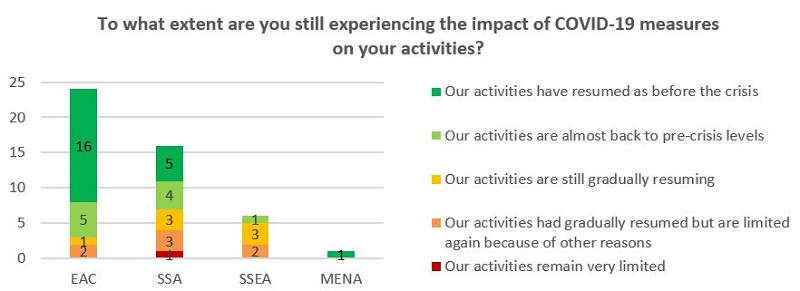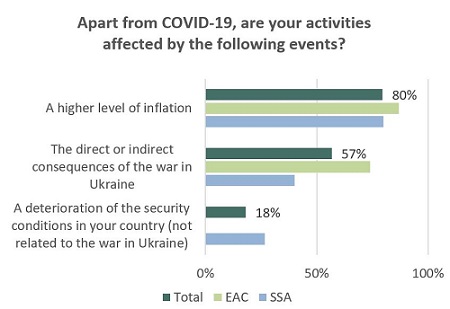
Inpulse and the Grameen Crédit Agricole Foundation have been working since 2020 on the analysis and monitoring of the effects of the COVID-19 pandemic crisis on the microfinance institutions (MFIs) for which they are the donors. This periodic monitoring, shared through several articles,[1] contributes to the exchange of information between the different stakeholders of the sector.
The conclusions presented in this article follow on from the last study conducted at the beginning of May 2022. Given the international context marked in particular by the war in Ukraine, the content of the survey has been adapted to gain a better understanding of the impact of this conflict on the microfinance sector. The 47 institutions that responded are located in Europe and Central Asia (ECA-51%), Sub-Saharan Africa (SSA-34%), South and South-East Asia (SSEA-13%) and the Middle East and North Africa (MENA-2%).[2]
- Latent risk of COVID-19 is gradually declining
As we have seen continuously over the past year with the global economic recovery, the major consequences of the containment phases since the beginning of the COVID-19 pandemic have gradually faded away for MFIs. At the end of May 2022, almost all respondents still report a continuous recovery of activities and 68% (32 MFIs) even report that they have returned or are close to returning to a pre-pandemic pace.

The main financial consequence of COVID-19 that 30% of the respondents still perceive is the persistence of a high-risk portfolio compared with the end of 2019. However, this point is becoming less and less significant as operations have been able to resume in a more or less stable manner and the moratoria granted are gradually being repaid.
This effect can be seen in the Grameen Crédit Agricole Foundation’s MFI portfolio as a whole, where the credit risk (PAR30, restructured loans and COVID-19 moratoria) is improving: it was 10% at the end of March 2022; compared with 21% at December 2020 (the average in 2019 was 5%). This improvement can also be observed in the portfolio of MFIs financed by Inpulse, both for clients in the MENA region and in Central and Eastern Europe. In the case of MENA clients, the deterioration of their portfolio was very significant in 2020, reaching up to 37% of their outstanding loans, but it improved significantly in 2022, to 14%, with a value closer to the pre-crisis risk level (10.2%). For Central and Eastern European clients, this credit risk was 3.3% in the first quarter of this year, compared with 8.6% in 2020, almost the same level as in 2019 (2.7%).
- Other events affecting microfinance institutions: inflation before the consequences of the war in Ukraine
 This survey clearly shows that other factors than the COVID-19 crisis are now affecting the activities of our partners. The first, mentioned by 80% of respondents, is the upsurge in inflation in recent months. Thus, the vast majority of the countries of operation of the respondents are affected by the significant rise in energy costs and, to a lesser extent, by that of agricultural products. These factors are closely linked to the start of the war in Ukraine and are therefore global in scope. Our partners in sub-Saharan Africa are also noting the difficulties in obtaining supplies from abroad in the current context and are reinforcing fears of a food crisis.
This survey clearly shows that other factors than the COVID-19 crisis are now affecting the activities of our partners. The first, mentioned by 80% of respondents, is the upsurge in inflation in recent months. Thus, the vast majority of the countries of operation of the respondents are affected by the significant rise in energy costs and, to a lesser extent, by that of agricultural products. These factors are closely linked to the start of the war in Ukraine and are therefore global in scope. Our partners in sub-Saharan Africa are also noting the difficulties in obtaining supplies from abroad in the current context and are reinforcing fears of a food crisis.
At the beginning of May 2022, the Europe and Central Asia region stood out for its exposure to other economic difficulties. For example, 50% of respondents in the region reported that their country was facing rising interest rates, 25% reported tensions on the local currency (partly resolved at the time of at the time of writing of this article), 21% pointed out reduced foreign capital flows and 17% reported a decline in remittances. Currency tensions appear to be much higher in Central Asian countries than in Europe. A situation of devaluation of the local currency was reported by 83% of Central Asian MFIs (6% for European MFIs) and 50% reported a reduction in capital flows and remittances (compared with 11% and 6% respectively for European MFIs).
Finally, some microfinance institutions note a deterioration of the security situation in their country, notably in sub-Saharan Africa (Burkina Faso, Mali, and South Africa), South-East Asia (Myanmar, Indonesia) and Palestine. Whereas these results are not discussed in depth here, our partners confirm these issues and their impact on their activities.
- Consequences on MFIs and their clients
The macroeconomic factors presented above are negatively affecting microfinance institutions. At the time of the survey, 50% of them indicated that they were already feeling the first effects, including 65% of those located in the ECA region – although some (Lithuania, Kosovo and Bosnia-Herzegovina) did not express such a feeling. The main consequence so far, mentioned by 39% of the affected MFIs, is the compression of their financial margin, which is mostly explained by the increase in funding costs over the last months, experienced by 32% of the respondents. This increase is mainly due to the cost of currency hedging on international loans, but also to the reduction of local hedging opportunities and access to local funding.
“The quotes offered by TCX/MFX for MDL continue to be too expensive” – Partner in Moldova
While this has not yet materialized at the time of this survey, at the beginning of the year MFIs also indicate that they fear an unbudgeted cost increase in the coming months.
“The increase in the price of fuel is affecting the institution’s expenses“ – Partner in Togo
Only a few MFIs cite the increase in portfolio at risk or the decrease in demand as immediate effects of the international context. However, this is a possibility in the coming months: 71% of them (all areas) consider the probability of deterioration high, although it is still too early to estimate it. And if this were to materialize, it would come directly from customers finding themselves in a more difficult situation, notably through a contraction in their disposable income and their ability to repay in the face of increased food and energy costs.
“We could be affected by the impact of the war on the economic situation of our clients” – Partner in Romania
“[We could be affected by] the increase in the cost of bread, due to the cost of supplying wheat flour” – Partner in Burkina Faso
Thus, even if the situation is until now well understood and seems to be under control by our partners with adapted measures, weak signals of real difficulties to be expected are clearly perceived. It seems that they are announcing a negative impact on their clients in the medium and long term.
Finally, let us note the humanitarian actions deployed from the first days of the outbreak of hostilities by certain MFIs in Central and Eastern Europe, which participate in the reception or emergency aid of Ukrainian refugees (Moldavia, Lithuania, Romania, Kosovo).
“From the company’s funds were purchased goods which are considered the necessities and donated to refugees Also, while some of our employees donated food, clothing, or money, others especially young people, decided to become volunteers. It is worth to mention that during last month Microinvest hired a refugee, which decided to remain in Moldova for a longer time within our IT team” – Partner in Moldova
____________________________________________________________